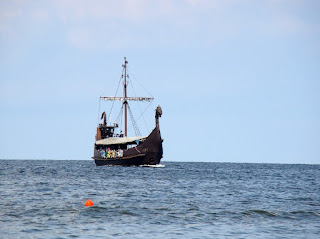 |
| Viking Ship Photo by axe20 at https://pixabay.com/photos/ship-sea-%c5%82%c3%b3d%c5%ba-the-vikings-2575146/ |
This world history resource focuses on the European
Middle Ages from 500 to 1000 and includes quiz questions
and answers and video links to related topics.
I utilized World History: Patterns of Interaction (Holt McDougal) for our world history textbook. It has multiple options for different learning styles and covers a wide array of information.
This quiz accompanies Chapter 13: pages 350-375.
Directions for the quiz:
- Scroll down and click on the thumbnail to enlarge to full screen.
- Click on the graphic to advance to the next screen.
- Choose an answer for each question.
- Compare your answers with those provided.
lot in to Kahoot! and search for Week 13 World History by Katrena.
- The Middle Ages in 3 ½ Minutes
- Crash Course: Medieval Europe
- Stains Benedict & Scholastica
- Charlemagne
- Feudalism in Medieval Europe
- Life in a Medieval Village
- Chivalry in the Middle Ages
- What was it like to be a Knight in Medieval Times
- Medieval Music - Troubadours
- Women in the Middle Ages
- Medieval Christian Church
- Investiture Conflict Rulers vs the Centralized Church
Thanks for visiting my Student Survive 2 Thrive blog.
Navigation is simple by using my site map,
topics on the right, or via my search bar.
Here are a few of my articles you may find helpful this week:
- Week 13 Visual Arts: Medieval Art and Illuminated Art
- Week 13 Ninth Grade ELA Assignments
- How to Save Money on Halloween
 |
| World History Week 13 European Middle Ages 500-1200 |
 |
| Created by Katrena All rights reserved. |
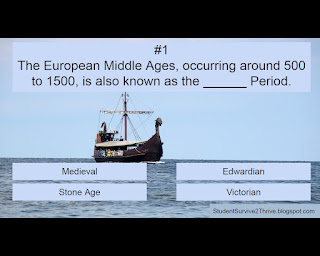 |
| The European Middle Ages, occurring around 500 to 1500, is also known as the ______ Period. Answer choices include: Medieval, Edwardian, Stone Age, Victorian |
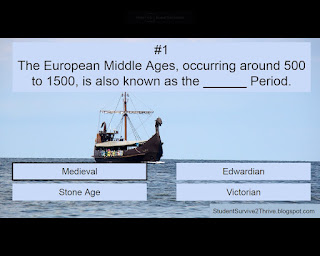 |
| The correct answer is Medieval. |
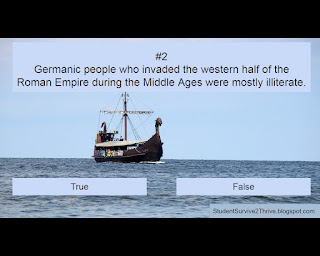 |
| Germanic people who invaded the western half of the Roman Empire during the Middle Ages were mostly illiterate. Answer choices include: true, false |
 |
| The correct answer is true. |
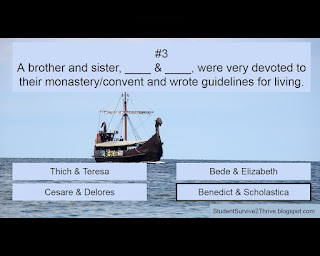 |
| The correct answer is Benedict & Scholastica. |
 |
| By 800, who was the most powerful king in Western Europe and was crowned “Roman Emperor” by Pope Leo III? Answer choices include: Charles Martel, Pepin the Short, Charles the Bald, Charlemagne |
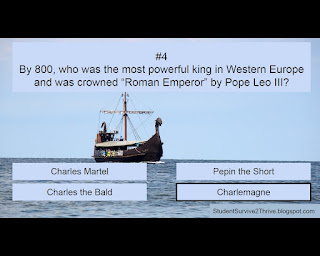 |
| The correct answer is Charlemagne. |
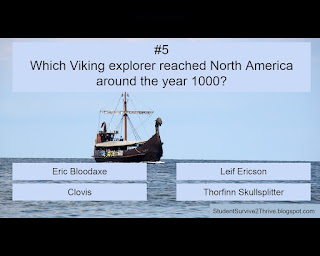 |
| Which Viking explorer reached North America around the year 1000? Answer choices include: Eric Bloodaxe, Leif Ericson, Clovis, Thorfinn Skullsplitter |
 |
| The correct answer is Leif Ericson. |
 |
| Skilled fighters on horseback who defended their lord’s land for fiefs were called ____. Answer choices include: knights, rooks, bishops, pawns |
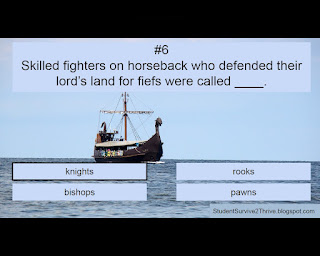 |
| The correct answer is knights. |
 |
| Peasants who by law had to live on particular plots of land where they were born while working for their lord were called ____. Answer choices include: vassals, merchants, serfs, slaves |
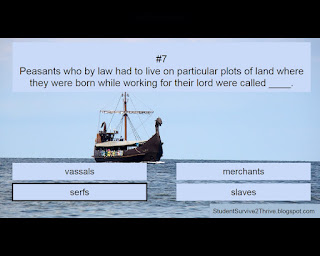 |
| The correct answer is serfs. |
 |
| Which of the following was usually obtained outside of a manor? Answer choices include: vegetables, salt, grains, fuel |
 |
| The correct answer is salt. |
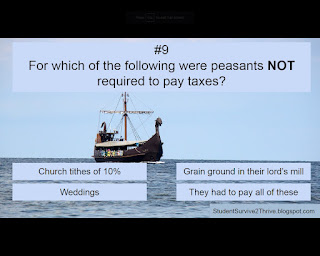 |
| For which of the following were peasants NOT required to pay taxes? Answer choices include: Church tithes of 10%, Grain ground in their lord's mill, Weddings, They had to pay all of these |
 |
| The correct answer is: They had to pay for all of these. |
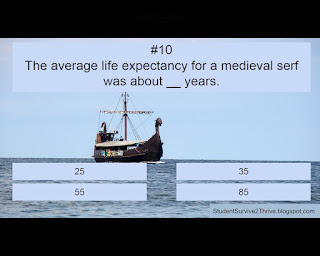 |
| The average life expectancy for a medieval serf was about __ years. Answer choices include: 25, 35, 55, 85 |
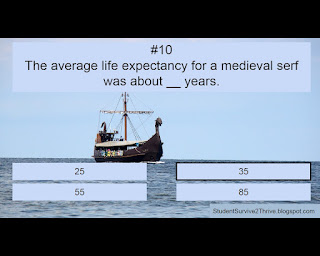 |
| The correct answer is 35. |
 |
| Most peasants during the medieval period sought to revolt against unfair living conditions. Answer choices include: true, false |
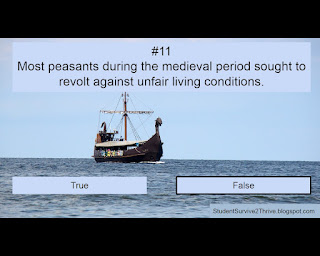 |
| The correct answer is false. |
 |
| Medieval knights adhered to the code of chivalry by devoting themselves to all of the following EXCEPT: Answer choices include: his heavenly lord, his peasants, his chosen lady, his feudal lord |
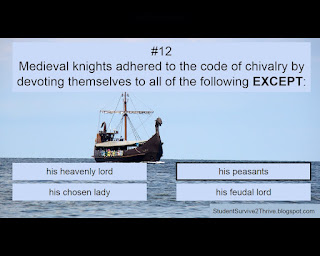 |
| The correct answer is his peasants. |
 |
| A ____ was a siege weapon that resembled a giant slingshot. Answer choices include: trebuchet, mentlet, tortoise, battering ram |
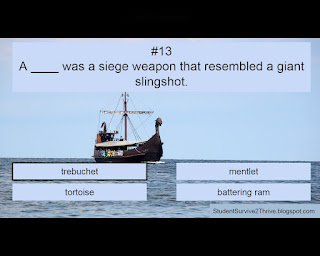 |
| The correct answer is trebuchet. |
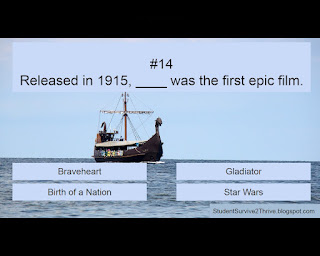 |
| Released in 1915, ____ was the first epic film. Answer choices include: Braveheart, Gladiator, Birth of a Nation, Star Wars |
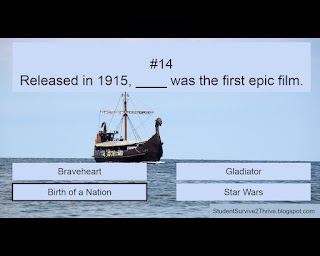 |
| The correct answer is: Birth of a Nation. |
 |
| Traveling musicians who performed at castles and courts were called _____. Answer choices include: merry men, jesters, troubadours, jokers |
 |
| The correct answer is troubadours. |
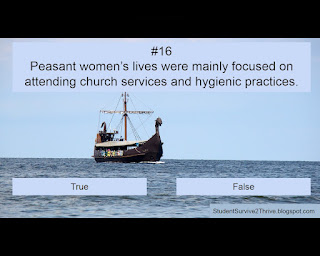 |
| Peasant women’s lives were mainly focused on attending church services and hygienic practices. Answer choices include: true, false |
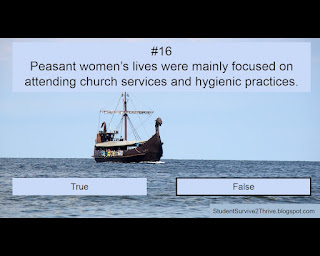 |
| The correct answer is false. |
 |
| Which was the highest rank of clergy in feudal Europe? Answer choices include: Priest, Bishop, Emperor, Pope |
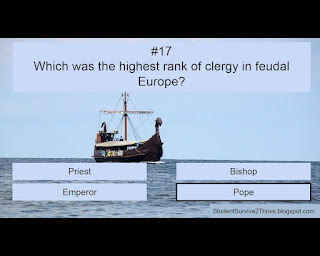 |
| The correct answer is Pope. |
 |
| The correct answer is interdict. |
 |
| Two punishments established for people accused of violating canon law were excommunication and ____. Answer choices include: interdict, sacrament, intermission, execution by cannon |
 |
| Pope Gregory VII excommunicated and later forgave a young German emperor named ____. Answer choices include: Otto, Henry IV, Charlemagne, Rollo |
 |
| The correct answer is Henry IV. |
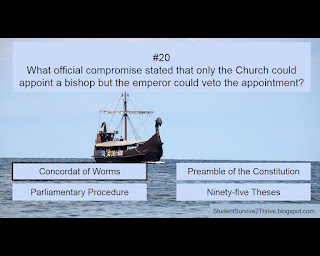 |
| The correct answer is Concordat of Worms. |
 |
| Find more resources at StudentSurvive2Thrive.blogspot.com |


No comments:
Post a Comment
Thanks for reading my article and sending your comment! Please note that I do not place links to other web sites on this blog.
Note: Only a member of this blog may post a comment.